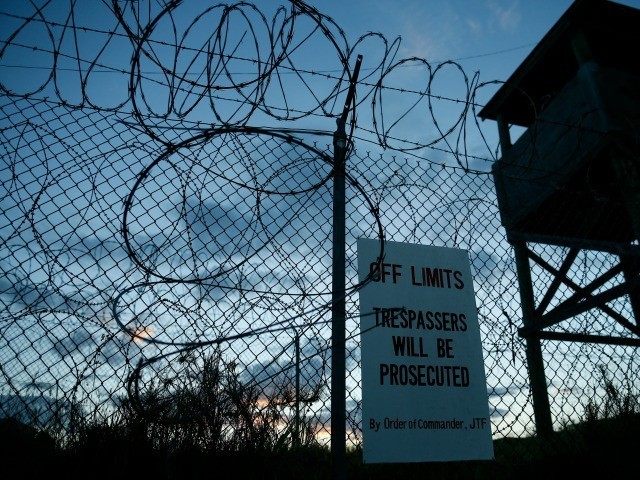WASHINGTON — Obama’s Periodic Review Board (PRB) held a hearing on whether an experienced bomb maker linked to al Qaeda should remain in custody at the U.S. military prison in Guantanamo Bay, Cuba.
Tariq Mahmud Ahmad Muhammad al-Sawah, a 57-year-old Egyptian national, is accused of having designed bombs used against American targets. He has been in custody at Guantanamo for nearly 13 years (since May 2002).
For no more than five minutes, the hearing was transmitted on a closed-circuit television from Guantanamo Bay to a viewing room near the Pentagon.
Sawah, an obese man in a dark shirt, was shown seated at a table with his attorney, his personal representatives, and other unidentified officials.
Members of the board were not shown. PRB is a national security decision-making panel that consists of one senior official from the Departments of Defense (DoD), Homeland Security, Justice, and State; the Joint Staff, and the Office of the Director of National Intelligence.
During the brief transmission of the hearing, a representative said that Sawah was “ready and willing to address any questions or concerns” the national security panel may have.
Thursday’s hearing was aimed at given Sawah an opportunity to convince the panel that he no longer poses a security threat to the U.S.
Sawah’s hearing was the 11th to occur since Obama created the PRB by executive order in March 2011.
The PRB hearings are considered semi-public and are intended to review all cases of prisoners being held indefinitely at Guantanamo.
There are 55 detainees waiting for PRB hearings. The Obama Administration would need to hold approximately one hearing per week to review all remaining cases by the end of this year.
“At the current rate, PRB hearings will not be completed for all eligible detainees until 2018, which would pose a significant obstacle to President Obama’s stated goal of closing Guantanamo before leaving office,” explained Human Rights First.
U.S. officials said hearings are expected to occur more frequently in the coming months. There is one scheduled for next week.
Sawah, a veteran of the war in Bosnia, was captured in Afghanistan.
He travelled to Afghanistan sometime in 2000 to attend al Qaeda training camps after joining the Bosnian Army in the 90s where he received weapons and explosives training.
In Afghanistan, he became an explosives instructor and skilled bomb maker for al Qaeda.
A detainee profile from the Pentagon said Sawah “was hostile to the guard force” during the first two years of his detention.
Although he “openly admits to having taken part in terrorism, there are no indications that he is interested in reengaging in extremist activity,” noted DoD profile.
Nevertheless, the profile also said that Sawah “would be capable of reengaging as an explosives expert or trainer. He retains extensive knowledge of explosives compounds and techniques.”
Sawah claims he wants to reunite with family members living in Egypt, Bosnia, and the U.S.
Congress prohibits the transfer of Guantanamo Bay detainees to the U.S. for any reason.
President Obama has vowed to close the Guantanamo prison, which has been in operation since 2002.
Obama ramped up his efforts to shut down the facility in 2014, moving 28 prisoners out of Guantanamo. Approximately 116 prisoners have been transferred out of Guantanamo under Obama.
The last detainees to be transferred out were five Yemenis.
That brought down the Guantanamo prison population to 122, including 54 who have been cleared for resettlement. The remaining 68 are considered too dangerous to be freed.
The majority (47) of the 54 detainees approved for transfer are Yemenis. There is a ban in place on transferring Guantanamo prisoners from Yemen.
In his State of the Union address on Tuesday, Obama said he will not relent in his determination to shut down the Guantanamo prison.

COMMENTS
Please let us know if you're having issues with commenting.